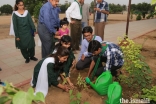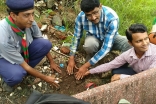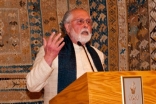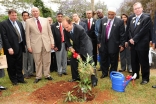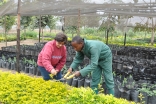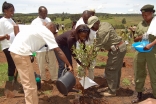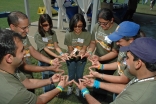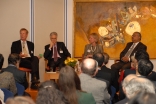Content Tagged with Environment
The word environment has many layers of meaning. It can be understood as our surroundings, conditions, or the natural world as a whole. It is comprised of our planet and its atmosphere, humans, animals, plants, and built structures that societies construct. The environment is all around us, and everyday we live within it.
Can you imagine life in a place where the very ground you stand on is not stable and it is almost routine to see the land sliding into the river when it rains? Where people know their schools, fields, yards, and even their homes are on unstable ground?
An enthusiastic group of students at the Khorog campus of the University of Central Asia (UCA) have formed an initiative to promote awareness of ecological issues and encourage participation in environmentally sustainable practices.
In Islamic tradition, society is encouraged to leave behind a wholesome and sustainable natural environment for those who will inherit the Earth. The Prophet Muhammad (peace be upon him and his family) is believed to have said "Even if the end of time is upon you and you have a seedling in your hand, plant it."
Thomas Woltz of Nelson Byrd Woltz Landscape Architects visited Islamic gardens in Egypt and India and saw how they were valued beyond their aesthetics — functioning as catalysts for economic, social and cultural change. How, he wondered, might an Islamic garden for the 21st century embrace Edmonton’s northern landscape year-round, while making a similarly positive impact?
Across India this 15 August, Ismailis celebrated their nation’s independence through acts that contributed to the wellbeing of society. Members of the Jamat planted trees, cleaned up local monuments and put on street plays to educate about traffic safety.
Forces of modernity are preventing a meaningful response to the environmental crisis in favor of economic interests, says Dr Seyyed Hossein Nasr. The renowned intellectual and pioneering environmental philosopher was delivering the inaugural Ismaili Centre International Lecture in Burnaby, Canada.
Nairobi, 19 October 2011 — With 2011 designated the International Year of Forests by the United Nations, the Aga Khan Development Network and Lions Clubs International committed to plant 1.5 million trees in Kenya by June 2012.
Lifelong educator Roshan Hemani has been hard at work on the site of the new campus of the Aga Khan University in Arusha. But instead of moulding young minds she is re-forming the landscape – Hemani and a team of gardeners are on a mission to plant 150 000 trees in the area. And the plant nursery she has established may become a vital source in sustaining Tanzania’s ecology for years to come.
There is near universal scientific consensus that the loading of the atmosphere with greenhouse gases is causing increased global warming and associated climate change, argues Abyd Karmali. Fortunately, he notes, several countries are putting in place policies to reduce their greenhouse gas emissions, which are resulting substantial new economic opportunities.
Over the last 25 years, AKDN has planted over 100 million trees in Asia and Africa. Many communities already recognise that sustainable agro-forestry provides dividends in the form of food, fuel and fodder, and the emergence of a global carbon market presents new opportunity.
Last week, Prince Hussain attended the Governors’ Global Climate Summit 3 in the United States on behalf of the Aga Khan Development Network, at Mawlana Hazar Imam’s request. Co-hosted by California Governor Arnold Schwarzenegger and the Governors of Washington, Oregon, Wisconsin and Michigan, the conference counted the AKDN among its major sponsors for the third consecutive year.
Prince Hussain attended the Governors’ Global Climate Summit 3 in the United States on behalf of the Aga Khan Development Network, at Mawlana Hazar Imam’s request. Co-hosted by California Governor Arnold Schwarzenegger and the Governors of Washington, Oregon, Wisconsin and Michigan, the conference counted the AKDN among its major sponsors for the third consecutive year.
This year, the annual PartnershipsInAction Walk in the United States launched with a green theme that draws attention to the impact of climate change. Underscored by the recent flood disaster in Pakistan, the Walk’s message has taken on an even greater urgency, and is echoed by volunteers across the country as they seek to raise awareness and support.
A group of proactive Ismailis are applying their innovative prowess to counter the spectre of climate change and ecological devastation. Inspired by Islam’s ethic of caring for the environment, they are doing their part to preserve and safeguard nature’s precious resources in order to sustain social and economic development.
Last November, four dedicated participants from the Partnership Walk & Run in the United Kingdom had a chance to see the impact of their efforts firsthand. They spent seven days in India, where they visited one of the projects selected to receive funds from the event. They recently shared their impressions with TheIsmaili.org.
Twelve years ago, Abyd Karmali witnessed the negotiation of the Kyoto Protocol to reduce global greenhouse gas emissions. Drawing on his experience, he discusses the crucial importance of the upcoming meeting in Copenhagen in addressing the current reality of the climate change crisis.
In February, an eminent panel convened in London as part of the Ismaili Centre Lecture Series to discuss global warming and its impact on the developing world. The panel turned its attention to the social impact of climate change, particularly in the developing world.
In Islam, protection of the physical environment is one of humankind’s responsibilities. The Aga Khan Planning and Building Service, Pakistan organised a nationwide Friends of the Environment art competition to raise awareness about the importance of the natural environment and methods of preserving it.





